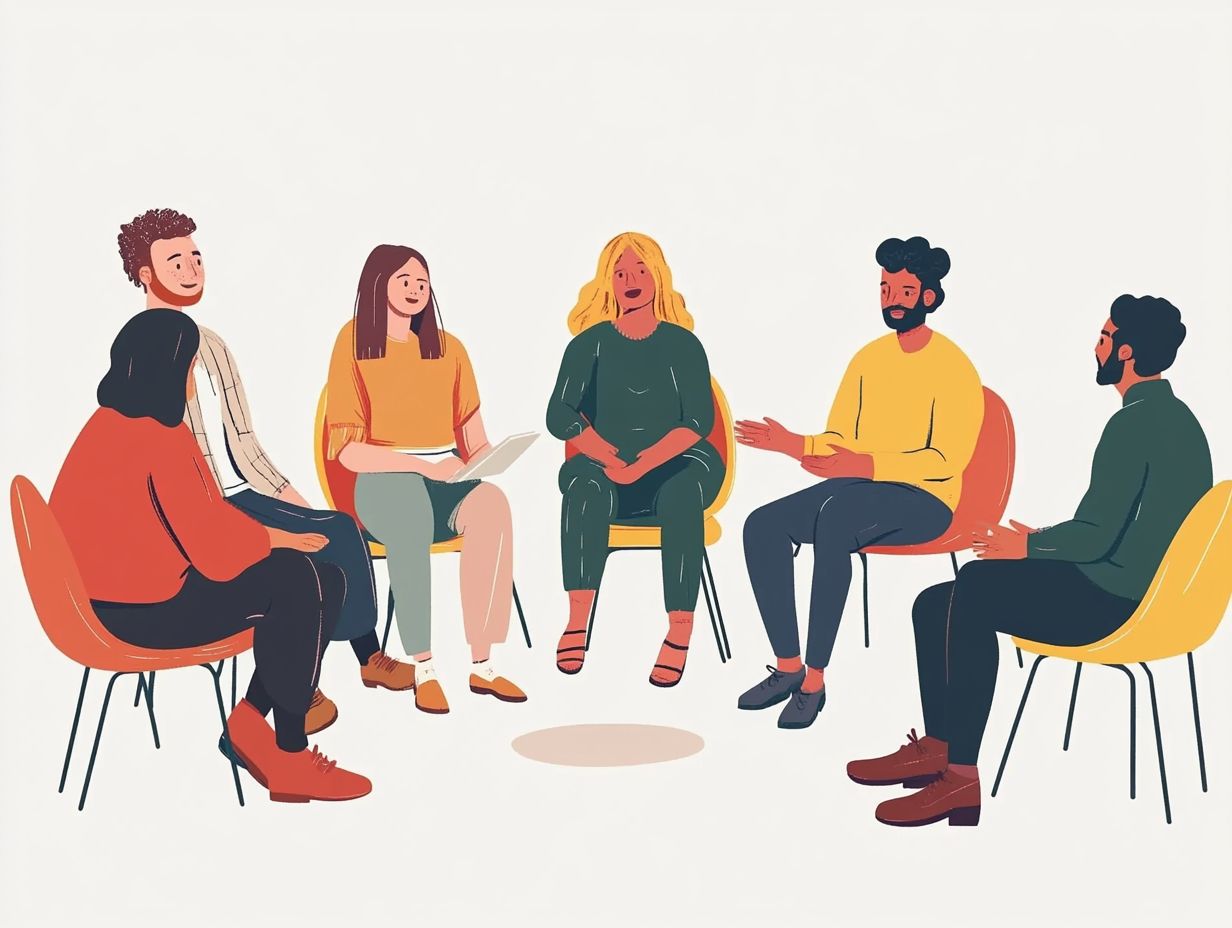How to Empower Others to Break Beliefs
Beliefs shape your perceptions and drive your behaviors, influencing everything from decision-making to personal relationships.
You may unknowingly hold onto limiting beliefs that obstruct your growth. This exploration delves into the profound impact of beliefs on behavior, identifies common limiting beliefs, and offers strategies to challenge and transform them.
This will also guide you on how to empower others, highlight the role of effective communication, and illustrate how to create a supportive environment that encourages growth.
Together, you will uncover the remarkable power of belief!
Contents
- Key Takeaways:
- The Power of Beliefs
- Identifying Limiting Beliefs
- How to Break Limiting Beliefs
- Empowering Others to Break Beliefs
- The Role of Communication in Empowerment
- Creating a Positive and Supportive Environment
- Frequently Asked Questions
- 1. How can I empower others to break their limiting beliefs?
- 2. What are some common beliefs that hold people back?
- 3. How can I create a safe space for someone to challenge their beliefs?
- 4. How can I help someone overcome their fear of breaking their beliefs?
- 5. Are there any effective techniques for breaking beliefs?
- 6. How can empowering others to break beliefs benefit them?
Key Takeaways:

- Beliefs significantly impact behavior and can limit growth and potential.
- Identifying and challenging limiting beliefs can lead to personal growth and empowerment.
- Supporting and communicating effectively can help others break their limiting beliefs and foster a positive environment for growth.
The Power of Beliefs
Beliefs serve as powerful engines of behavior, profoundly shaping your life. They influence aspects ranging from workplace culture to personal growth.
Recognizing the impact of beliefs, particularly limiting ones, is essential for cultivating a success-oriented mindset and enhancing team efficiency.
These self-imposed limitations often arise from the way our surroundings shape our thoughts and past experiences. They manifest as negative thoughts and self-deprecating behaviors that can undermine your emotional well-being.
By actively challenging these beliefs, you can unlock avenues for innovative ideas and personal development. This fosters effective collaboration and significantly boosts productivity levels.
Understanding the Impact of Beliefs on Behavior
Your beliefs fundamentally shape your behaviors and decision-making processes. This makes self-awareness essential for identifying how limiting beliefs influence your actions.
When you cling to negative thoughts and limiting beliefs, you may unconsciously erect barriers that impede personal growth and emotional well-being. Acknowledging these internal obstacles is often the crucial first step toward transformation.
Practicing mindfulness and reflecting on your thought patterns can provide deeper insights. This enables you to differentiate between productive and counterproductive beliefs.
Incorporating positive affirmations into your daily routine can be a powerful tool. This encourages you to challenge negative narratives and replace them with uplifting statements that foster self-confidence and resilience.
This shift enhances your emotional health and paves the way for personal development and lasting change.
Identifying Limiting Beliefs
Identifying limiting beliefs involves a profound journey of self-reflection and a keen awareness of negative self-talk. Often, this negative self-talk arises from impostor syndrome the feeling that you aren’t as competent as others think you are and the fear of failure.
It’s essential to explore these inner dialogues to uncover the roots of your doubts and reshape your mindset for greater success.
Recognizing Common Limiting Beliefs
Common limiting beliefs often creep in as fears of failure and a tendency to compare yourself to others. This leads to an unending stream of negative thoughts.
These beliefs often arise from societal norms that champion competition and perfectionism. They cast doubt on your capabilities and worth. For instance, you might hesitate to chase a new career opportunity, convinced that others are more qualified or deserving.
This comparison stifles your personal growth and cultivates a nagging sense of unworthiness, making it even more challenging to take risks.
When you let these beliefs take hold, you risk missing out on incredible opportunities! Internalizing them may ensnare you in a cycle of self-doubt, ultimately hindering your ability to reach your full potential and fulfill your dreams.
How to Break Limiting Beliefs

Breaking free from limiting beliefs requires you to challenge those deeply ingrained thoughts. By taking actionable steps and nurturing a growth mindset, you can transform your mindset and create pathways for profound personal and professional transformation.
Reflect on your beliefs today! What limiting beliefs can you identify, and how will you challenge them moving forward?
Strategies for Challenging and Changing Beliefs
Effective strategies for challenging and changing beliefs include enhancing your self-awareness, utilizing positive affirmations, and implementing journaling techniques to explore any underlying fears of failure.
Engaging in reflective journaling allows you to create a safe space to confront uncomfortable feelings and dissect the origins of those fears. This practice reveals how these fears have shaped your personal narrative. Incorporating prompts like “What do I truly believe about my abilities?” can help you uncover limiting beliefs that may be unconsciously holding you back. Embracing a growth mindset and regularly practicing self-compassion will further facilitate your journey of self-discovery.
As you embark on this transformative process, you ll not only recognize the power of your thoughts but also discover practical tools to cultivate resilience and empowerment, ultimately paving the way for a more fulfilling life.
Empowering Others to Break Beliefs
Empowering others to overcome their limiting beliefs necessitates creating a supportive environment that encourages vulnerability within teams. This approach builds a culture full of empowerment and growth, highlighting the power of community in overcoming beliefs, allowing individuals to thrive and reach their full potential.
Supporting and Encouraging Others to Overcome Limiting Beliefs
Supporting and encouraging others to break free from their limiting beliefs is made easier through positive affirmations and effective team communication, which promotes emotional well-being. Learning how to transform limiting beliefs can further enhance this supportive environment.
When you make team members feel valued and heard, they are far more likely to embrace challenges with newfound confidence. Regularly expressing appreciation for individual contributions cultivates a culture of respect, elevating everyone’s spirits in the process.
Fostering open dialogue, where team members share both their successes and struggles, strengthens relationships and nurtures a supportive atmosphere. By actively engaging in these practices, individuals will see a boost in self-esteem, and the overall morale of the workplace will flourish, paving the way for enhanced collaboration and productivity.
This environment cultivates creativity, allowing everyone to bring their best selves to the table.
The Role of Communication in Empowerment
Effective communication is essential for empowerment, as it significantly boosts team efficiency and fosters collaboration through open feedback mechanisms.
By prioritizing clear dialogue, you create an environment where ideas flow freely, enabling your team to thrive collectively.
Effective Communication Techniques for Empowering Others

Effective communication techniques, such as active listening listening carefully to understand others and constructive feedback, are crucial for empowering others and nurturing emotional health within your teams. These practices cultivate an open dialogue where every team member feels valued and understood.
By prioritizing emotional intelligence, you can more effectively identify and respond to the feelings and needs of your colleagues, creating a supportive environment that fosters growth. Regular feedback loops not only promote personal development but also enhance team cohesion.
Encouraging vulnerability in discussions can further strengthen trust, allowing team members to voice their concerns without fear. This openness is vital for maintaining a positive and productive atmosphere. Ultimately, by integrating these strategies, you enable individuals to thrive, contributing significantly to the overall success of the team.
Creating a Positive and Supportive Environment
Creating a vibrant and supportive environment in the workplace is vital for enhancing team communication. It cultivates a culture that not only encourages innovative ideas but also plays a crucial role in ensuring employee retention.
Ways to Foster a Culture of Empowerment and Growth
Fostering a culture of empowerment and growth means implementing practices that promote positive affirmations and enhance self-awareness among team members.
To achieve this, encouraging open communication is invaluable. This allows team members to voice their thoughts and ideas freely.
Regular team feedback sessions boost morale and enhance self-awareness. This recognition empowers you to focus on your strengths and areas for improvement.
Offering professional development opportunities, such as workshops on emotional intelligence, helps understand better how people interact with each other.
Team-building activities that focus on collaboration help build trust and camaraderie. Ultimately, this leads to increased efficiency and productivity within the organization.
Make these practices a priority now to cultivate a rewarding environment where every team member feels valued and empowered.
Frequently Asked Questions
1. How can I empower others to break their limiting beliefs?
You can empower others by actively listening to their beliefs and acknowledging their feelings. Challenge their beliefs with evidence and alternative perspectives, and encourage them to take small steps towards mentoring someone through limiting beliefs.
2. What are some common beliefs that hold people back?

Some common beliefs that hold people back include thoughts like “I’m not good enough,” “I’m too old/young,” or “I’ll never be successful.” These beliefs can limit an individual’s potential and prevent them from reaching their goals.
3. How can I create a safe space for someone to challenge their beliefs?
Creating a safe and non-judgmental environment is key to empowering others to challenge their beliefs. You can do this by listening without interrupting, validating their feelings, and refraining from making assumptions or passing judgments.
4. How can I help someone overcome their fear of breaking their beliefs?
You can help someone overcome their fear by providing support and reassurance. Share your own experiences of overcoming limiting beliefs and help them create a plan to gradually challenge their beliefs in a safe and manageable way.
5. Are there any effective techniques for breaking beliefs?
Some effective techniques for breaking beliefs include mindfulness practices, cognitive-behavioral therapy a method that helps change negative thought patterns and reframing techniques. It’s important to find the approach that works best for the individual and to be patient, as it may take time and effort to see results.
6. How can empowering others to break beliefs benefit them?
Empowering others to break their limiting beliefs can lead to increased self-awareness and confidence, improved problem-solving skills, and a sense of empowerment and control over their lives. Learning how to guide others in overcoming limiting beliefs can also open up new opportunities and lead to personal growth and development.






